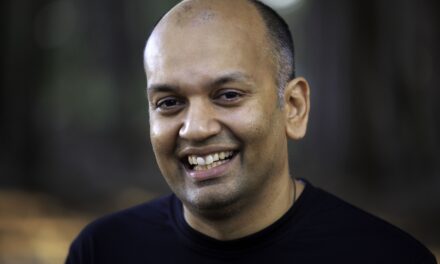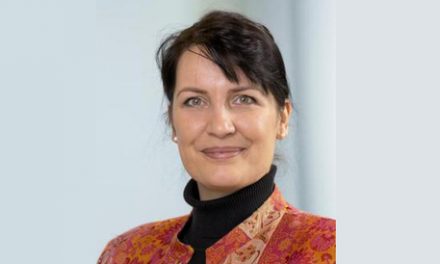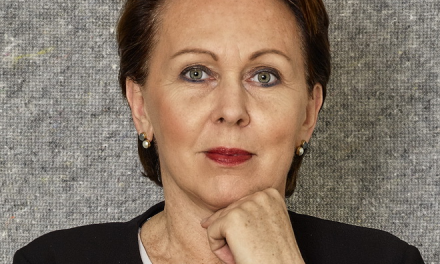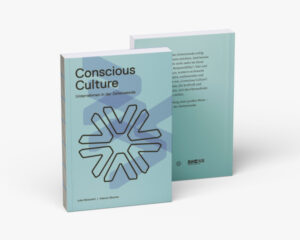Nipun Mehta
is the founder of ServiceSpace, an incubator of projects that works at the intersection of volunteerism, technology and gift-economy
Reading Time: 8 minutes
What if your cheque read zero after you had an excellent meal in a restaurant?

And what if you found out that a person who ate here before you paid your bill?
Would you then pay it forward for those who dine after you?
Many people would as it left them with a warm feeling of gratefulness for the excellent food but even more for the stranger who gifted them anonymously with a meal.
KarmaKitchen is the name of such a restaurant, and it exists internationally in 23 venues but also acts repeatedly in popup kitchens like lately in Vienna hosted by www.markhof.wien, cooked by Sebastian Müller, www.nasesiebzig.com and the incredible crowd of www.dreamacademia.com.
 Special guest Nipun Mehta is the founder of KarmaKitchen but also of many other volunteer-based initiatives like www.ServiceSpace.org, www.kindspring.org, www.dailygood.org. This network meanwhile encompasses more than five hundred thousand members and delivered millions of dollars in free services.
Special guest Nipun Mehta is the founder of KarmaKitchen but also of many other volunteer-based initiatives like www.ServiceSpace.org, www.kindspring.org, www.dailygood.org. This network meanwhile encompasses more than five hundred thousand members and delivered millions of dollars in free services.
From its very inception, the focus of these projects has been on the inner change that comes when people take the opportunity to act selflessly. Nipun has received many awards like Dalai Lama’s Unsung Hero of Compassion and has been appointed in 2015 to President Obama’s council on poverty and inequality. He believes that groundedness in foundational values and changes in education will be our compass to navigate the terrain of the unknown future. A future where work will be redefined as we have no experience of working in an environment that consists of different entities like artificial intelligence augmented human beings and biotech applications.
You built an international ecosystem run by volunteers aiming to bring more kindness to the world. How did you begin?
Nipun Mehta: Service Space never really tried to create itself. It just happened. We started in 1999 in Silicon Valley, where greed was in the air. Everyone started dot-com companies and dreamt of selling it for millions. We wanted to do something different. We were four people who wanted to serve without strings attached. We went to a homeless shelter to offer help. As we didn’t exactly know how to help, we offered to build them a website. I was an engineer from Silicon Valley, and at that time, nobody knew what a website was. It was very innovative. So we had to convince the people from the shelter of the advantages.
I remember once a woman gave me a screwdriver and said: You guys look like good people, here’s a screwdriver, here’s my computer, you can put in whatever you want.
(Nipun smiles) When I said: No, we’re going to do it from home. She frowned and asked: What kind of volunteering is this?
With this act, a revolution began, and as a side effect, you built a market for volunteering in developing websites?
Nipun Mehta (laughs): Yes. This is how it started. We soon got press coverage, because, at that time, volunteering was not very common. We didn’t even build a nonprofit organization it was just love. And it grew. Thousands of volunteers took time off from their fancy jobs – sometimes only for a few hours a week – and signed up for the simple idea of helping nonprofits to build websites. No money was charged. Everything was for free.
And a whole network of volunteers evolved…
Nipun Mehta: Over the next dozen years, we delivered millions of dollars in free services, and organically grew our programs into over a dozen core projects. More than five hundred thousand users joined as members. We never held any intention to build an organization or create systemic change.
We had no plans, no agenda, no strategy, and yet, everything emerged. I would never have thought that in 20 years, we would be where we are today. But here we are. It’s just one small step at a time.
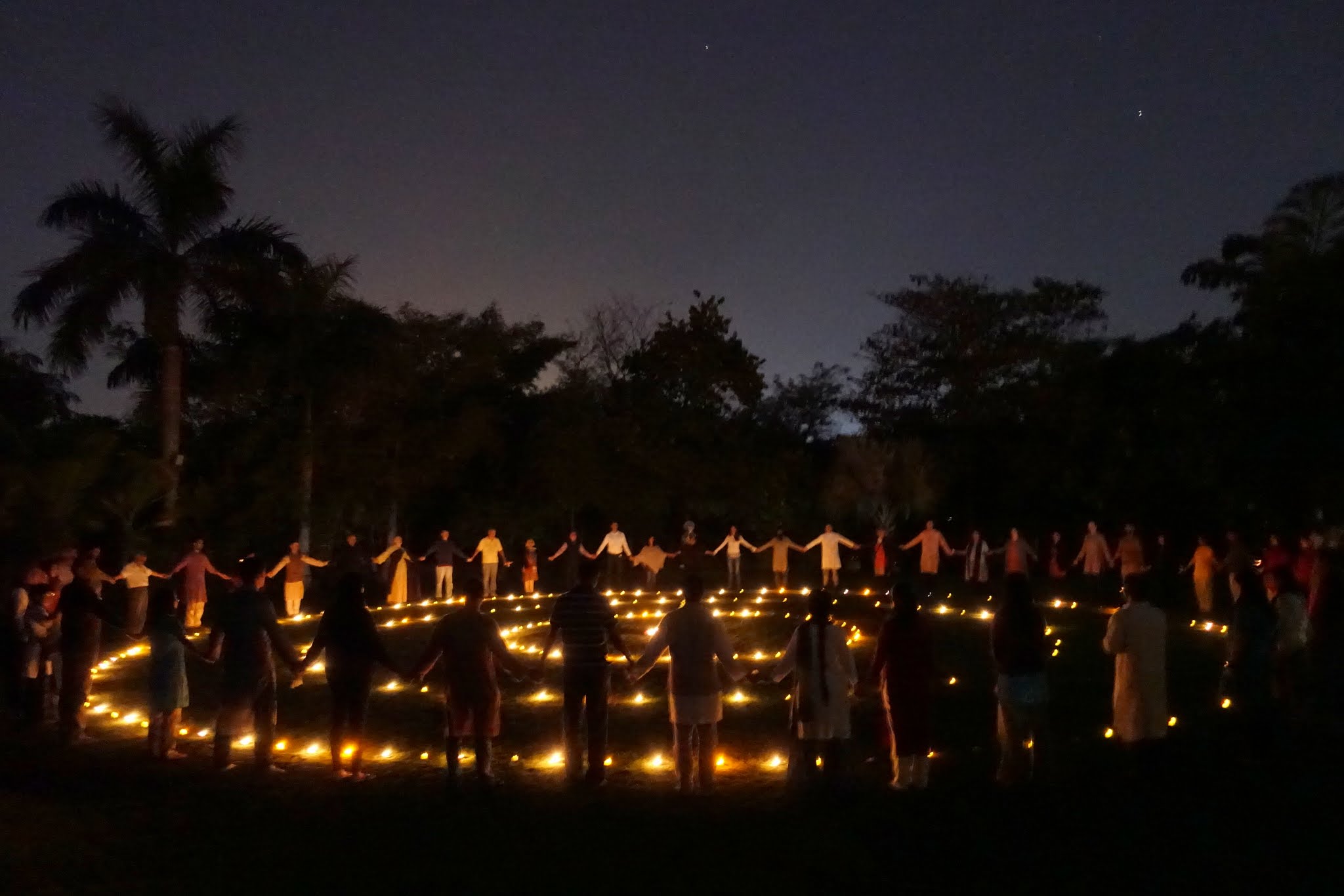
How can one become part of this network?
Nipun Mehta: Tag someone with a Smile Card, sit in silence in an Awakin Circle, sign up for DailyGood, volunteer on a ServiceSpace project, start a gift-economy endeavor, host an event with everyday heroes, or do an act of kindness that makes you come alive. In serving others, we stay connected.
Do you have a plan where the future will take you?
Nipun Mehta (laughs): The real answer is no. But if you want me to sound intelligent, I can give you some answers.
Maybe just an idea?
Nipun Mehta: One of the things that I’m very excited about and which will launch soon, it’s the idea of multiple forms of capital. We think that wealth equals money, but there are numerous other forms of wealth. We have many systems that keep the wheels of money spinning, markets, derivatives, people trading in all kinds of ways.
We haven’t started to do that with other forms of capital like time, or community, or nature, or even attention. There are a million different kinds of capital.
How do you start to engage with these different forms of capital?
Nipun Mehta: We want to create a marketplace that accepts multiple forms of capital as payment.
How could that look like?
Nipun Mehta: For example, let’s say I make a little beanie and put it on sale online. Normally, when you purchase something online, you can choose between different forms of payment like credits cards, PayPal, or other financial payment options at the check-out. But you could also chose from a list of alternative payment options to contribute to this beanie.
What options could that be?
Nipun Mehta: You may say: I’m willing to receive community capital for my beanie. So I go out, do an act of kindness, tell you the story, and you’re happy with that.
Or you may want meditation capital. So I meditate for an hour, write a reflection, and share it with you. Or you want to be paid in kindness capital. So I do an act of kindness with my kids, take a photo and send it to you. I may as well donate to a nonprofit, and send you the receipt.
Imagine you would have all these other options to choose from and what would that look like?
The idea that you don’t want anything in return for yourself would create a beautiful connection.
I think a lot of people would care for connection more than they care for financial capital. This portal will allow that to happen. The idea is not trading favors and hence trading in an alternate currency. It’s paying it forward and trusting that process.
How did this idea come up?
Nipun Mehta: Many people ask us where they could share their gifts. At the moment there’s no space for these gifts to be shared because our market economy is very narrow.
With this platform, we liberate these gifts and put them into circulation in society. I think this is going to be a game-changer.
Do you think basic income could help in this process as it could be a way to change the perception of how we value work? If we had basic income, we wouldn’t be respected for how much money we have as it is now the case for many people. Respect could come from how much we contribute to society.
Nipun Mehta: I think the only reason we will have a basic income is because robots have taken over our jobs. This is the main motivation for people to have this conversation. I don’t think the intention is making people equal; it is a defensive measure. Digitization and robots are replacing many jobs already, and many more will be gone soon. Ultimately we’ll have to change people’s mindsets and hearts if we want to have a truly revolutionary way of looking at life.
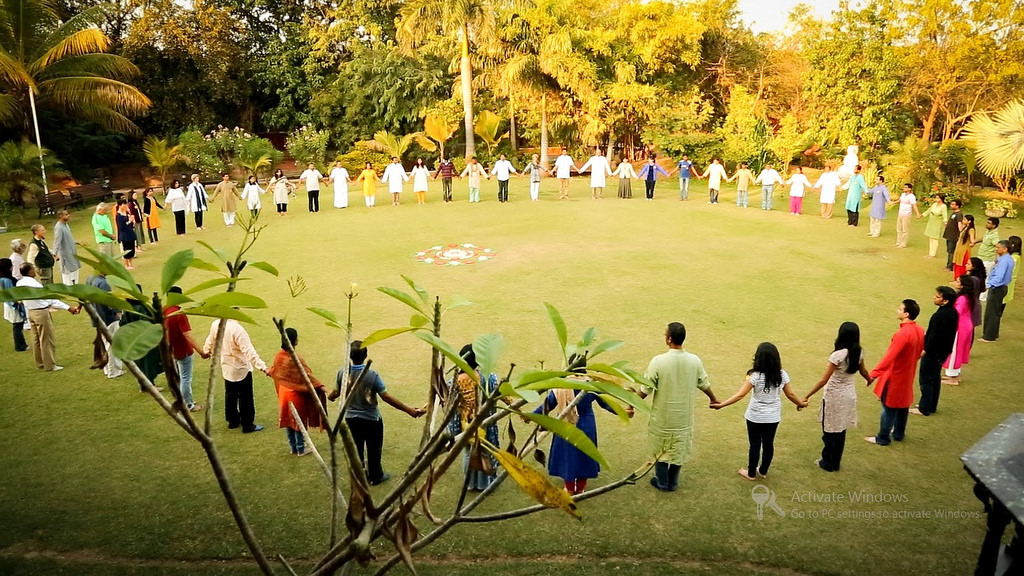
How will we achieve this?
Nipun Mehta: Up to a certain point during the history of humanity, it was just survival. Now that we have that taken care of in many parts of the world, what are the meaning and purpose?
The edge is that on one side you have power and on the other meaning. The more power we have, the more we dominate nature with all our technology, the less meaning we have. In times when we had less power, we created stories and myths that helped us to navigate a world that we weren’t in control of – like the thought that the gods controlled the weather.
Now the rise in technology gives control over many things, and we have less meaning. I think work is going to be completely redefined in the coming decade as we have many open questions for which we have to find answers.
What questions are those?
Nipun Mehta: For example, we don´t know what it means to work in a setting where you’re cooperating with different entities like artificial intelligence, augmented human beings, and biotech applications. We don´t have the experience to rely on when it comes to this field. Our education system is designed to prepare us for a known future; it doesn’t prepare us to handle the unknown.
With the rate of exponential change, we are soon facing an unknown future. And not a future of 50 years but an unknown future of five years. Ten years ago, we had no Whatsapp or Smart Phone. It´s incredible what happened. We could have never predicted this development. We are almost at a point where we’re facing an unknown future, but we have a population that is educated to handle the known. Soon we will need persons who can work confidently in an unknown environment. I don’t think we have a sufficient supply of people who know how to navigate the unknown with skillfulness, because there’s no recipe for it.
But if you’re grounded in foundational values, you’ll be able to navigate this terrain.
How could we change our education to learn how to navigation the unknown?
Nipun Mehta: Grounding the educational experience in values could be a strategy. The former process of education based on the thought that students were empty buckets that need to be filled with knowledge. A different approach could be to think about education as lighting the flame within.
We are not born bankrupt and need to have education dumped on us. Education is about helping to awaken what was already there.
If we move to that model, we will have a population that understands that the circumstances are changing and that their values are the guiding light.
It took 38 years for radio to hit 50 million users, for TV it took 13 years, for the android operating system it was 18 months – the timeline is shrinking and shrinking. It’s happening so fast, the only way to navigate it is to have a foundation of values. And I think we’ll do that once we understand that teaching is not filling an empty bucket, but rekindling the inner flame. That makes me optimistic about the future.
About:
 Nipun Metha is the founder of ServiceSpace, an incubator of projects that works at the intersection of volunteerism, technology and gift-economy. What started as an experiment with four friends in Silicon Valley has now grown to a global ecosystem of over 500,000 members that has delivered millions of dollars in service for free. Nipun has received many awards, including the Jefferson Award for Public Service, Wavy Gravy’s Humanitarian award, and Dalai Lama’s Unsung Hero of Compassion. In 2015, President Barack Obama appointed him to a council on poverty and inequality. Nipun is routinely invited to share his message of “giftivism” to wide ranging audiences, from inner city youth in Memphis to academics in London to international dignitaries at the United Nations; his speech at UPenn commencement in May 2012 was read by millions. He serves on the advisory boards of the Seva Foundation, the Dalai Lama Foundation, and Greater Good Science Center.
Nipun Metha is the founder of ServiceSpace, an incubator of projects that works at the intersection of volunteerism, technology and gift-economy. What started as an experiment with four friends in Silicon Valley has now grown to a global ecosystem of over 500,000 members that has delivered millions of dollars in service for free. Nipun has received many awards, including the Jefferson Award for Public Service, Wavy Gravy’s Humanitarian award, and Dalai Lama’s Unsung Hero of Compassion. In 2015, President Barack Obama appointed him to a council on poverty and inequality. Nipun is routinely invited to share his message of “giftivism” to wide ranging audiences, from inner city youth in Memphis to academics in London to international dignitaries at the United Nations; his speech at UPenn commencement in May 2012 was read by millions. He serves on the advisory boards of the Seva Foundation, the Dalai Lama Foundation, and Greater Good Science Center.



